-
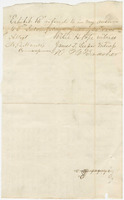
-
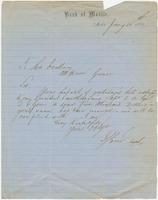
J.S. Green writes to A.B. Moore, governor of Alabama to confirm that his letter to the President, the President of the Confederacy, authorising the D.C. Green, the Assistant Quartermaster General, to withdraw $5,000 has been recieved and that the Bank of Mobile will discharge the money.
-
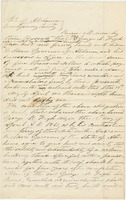
George M. Tigh and John P. Tigh were contracted to build a powder magazine for the State of Alabama.
-
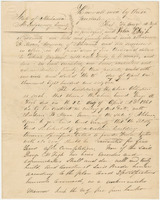
This letter details a warranty bond of George M. Tigh and John P. Tigh for building a powder magazine for the State of Alabama.
-
In the letter, Moore commends Watson for being "truly Southern in his feelings," and recommends him to the "favorable consideration of Southern citizens."
-
This is letter states that $5,000 worth of gold will be sent by express to the Governor
-
The receipt was signed by Cashier Robert Lapsley and State Comptroller W. J. Greene at the Comptroller's Office in Montgomery, Alabama.
-
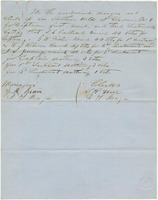
Certification letter from the managers and clerks of an election held in Claiborne for company officers in the Alabama Militia. The document records the vote totals for Captain, 1st Lieutenant, 2nd Lieutenant, and 3rd Lieutenant. It also lists the names of voters who participated in the election.
-
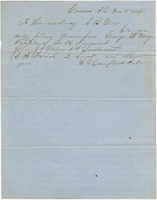
Letter from H. G. Campbell to Governor Andrew B. Moore requesting military commissions for officers in the 36th Regiment of the Alabama Militia.
-
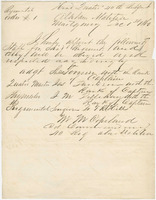
Regimental order from Colonel M. M. Copeland appointing staff officers to the 40th Regiment of the Alabama Militia.
-
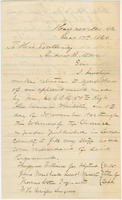
Letter from H. M. Larey to Governor Andrew B. Moore reporting staff appointments for the 58th Regiment of the Alabama Militia. Larey informs the Governor of several appointments he made to fill positions within his regimental staff, made public through a local newspaper. He notes which officers are considered commissioned according to the state’s military code.
-
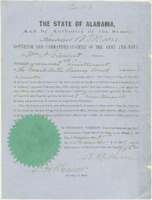
Commission letter from Governor Andrew B. Moore to William A. Clemens, appointing him 3rd Lieutenant of the Guards of the Sunny South in Lowndes County, Alabama. Moore informs Clemens of his election to the position and officially commissions him under the provisions of Alabama’s 1860 military organization act.
-
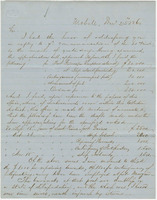
This letter from Thomas J. Butler to Governor A.B. Moore is written to provide details about financials circumstances regarding certain forts and military occupations around Alabama. The letter also details the hearts and emotions of the people surrounding the area about their reaction and committment to war
-
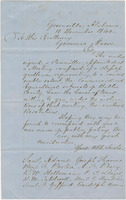
This letter from the citizens of Butler County was written to Governor A.B. Moore as a result of their meeting. They wrote to describe the policies enacted as a result of this meeting in hopes that Governor Moore would approve of their endeavors.
-
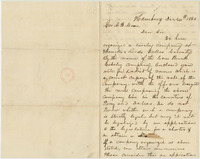
This letter, written by J.H. Robbins, is a brief request for Governor Moore to grant him a commission in the army. Robbins states he has a calvary command ready upon the request granted from Governor Moore.
-
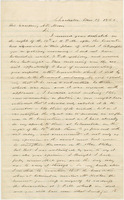
J.A. Elmore is writing to Governor A.B. Moore to update him on the state of the convention to discuss secession. Elmore is describing the beliefs and opinions of each state and how it will support or withdraw support as a result of the overall move toward secession.
-
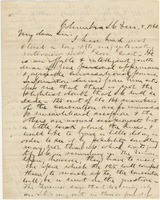
This is a letter written to Governor A.B. Moore from I.W. Garrott in December of 1860. This letter describes the need for secession. It specifically describes the role of South Carolina in secession.
-

Account between the Metropolitan Guards and N. J. Doolittle for whitewashing and cleaning armory.
-
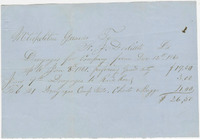
Account between the Metropolitan Guards and N. J. Doolittle for drayage and other services.
-

Account between the Metropolitan Guards and E. A. Doolittle for making 15,000 ball cartridges.
-
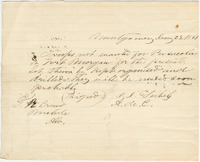
In the letter, Colonel Seibels instructs Crews to organize and drill troops as they will "be needed soon probably.
-
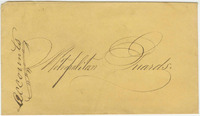
The Metropolitan Guards were a volunteer militia company formed in Montgomery County, Alabama. During the Civil War, they joined Company F of the 3rd Alabama Infantry, C.S.A
-
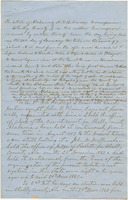
A written response by Commissioner N.B. Mardis of the answers given by J T Leeper, Rich H Brasher, and Willis M Pledger to the questions laid out in a list of seven from earlier that month. These answers come from the deposition of the above on January 25th, 1861 between 9 am and 5 pm.
-
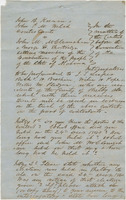
A list of seven written interrogatories to be given to J T Leeper, Richd H Brasher, Wilie H Pope, & Willis M Pledger, and their answers to be read in court as evidence. No answers are written, only questions.
-
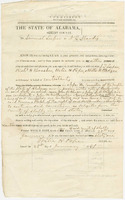
A typed Commision to take deposition to Samuel Leeper and N.B. Mardis. Leeper and Mardis are named as the commissioners who will examine J T Leeper, Rich H Brasher, Wilie H Pope, and Willis M Pledger. The case is a contest from two men against the right of two delegates to their seats in the Convention of the People of Alabama as delagates from Shelby.






















